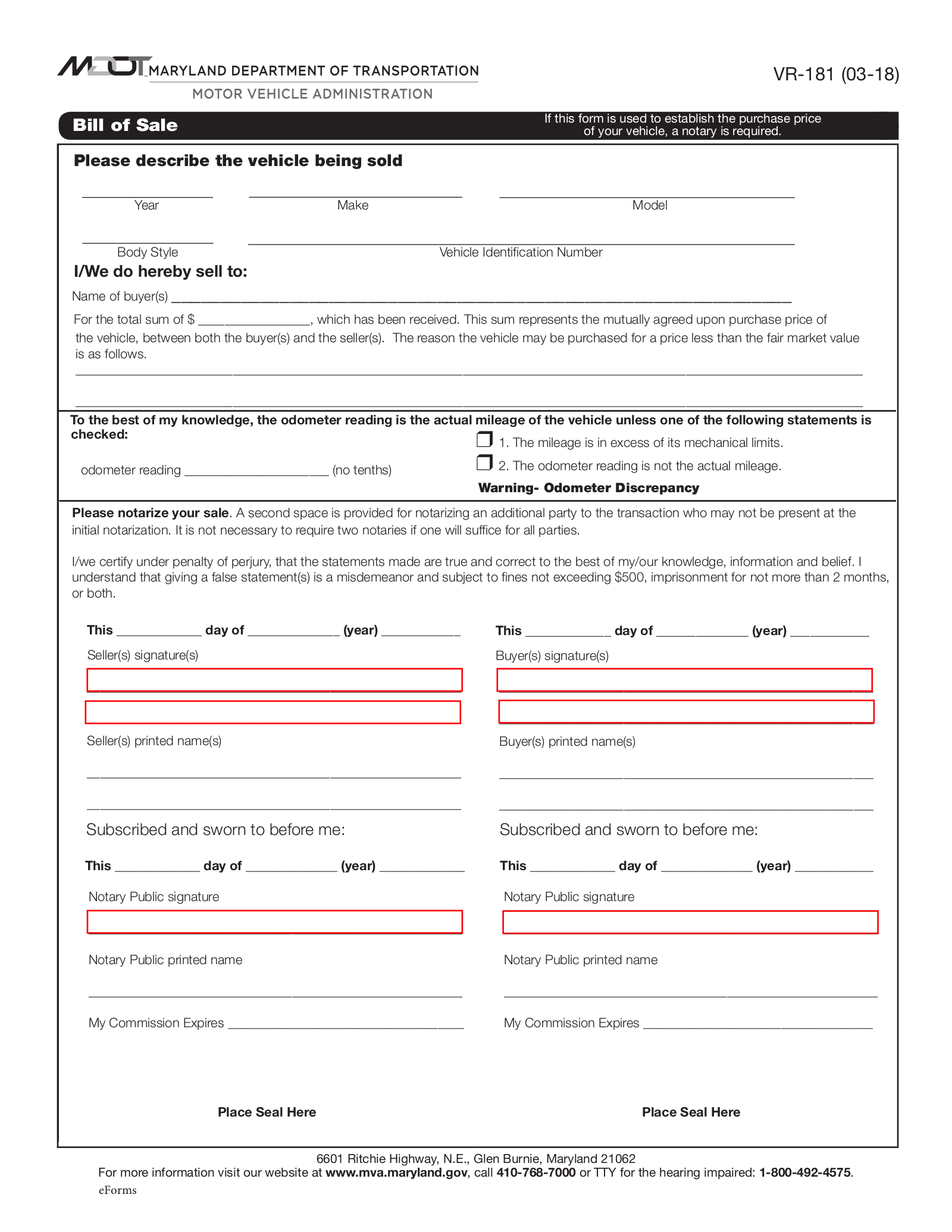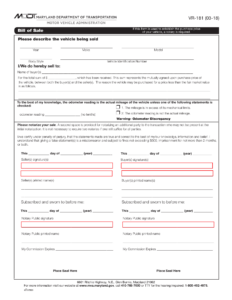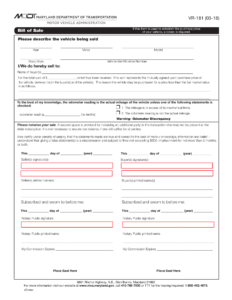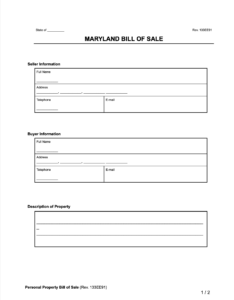Buying or selling a car can be an exciting time, but amidst all the excitement, it’s crucial not to overlook the legalities that protect both parties involved. In Maryland, just like in many other states, a car bill of sale is more than just a piece of paper; it’s a vital document that officially records the transfer of ownership from one individual to another. It serves as undeniable proof of the transaction, safeguarding both the buyer and the seller from potential disputes down the line.
Think of it as your official receipt and declaration rolled into one, outlining all the key details of the sale. Without it, you could face difficulties with vehicle registration, title transfer, or even legal challenges if any issues arise after the transaction. Ensuring you have a properly completed bill of sale tailored to Maryland’s requirements can provide immense peace of mind.
The Indispensable Role of a Car Bill of Sale in Maryland Vehicle Transactions
When you’re dealing with a vehicle sale in Maryland, having a comprehensive bill of sale isn’t just a good idea; it’s a fundamental step towards a legally sound transaction. This document acts as a clear record of the agreement made between the buyer and the seller, detailing the specific terms of the sale, the condition of the vehicle at the time of transfer, and the agreed-upon price. It’s the cornerstone that prevents misunderstandings and provides a legal reference point if questions about the sale ever come up in the future.

For the buyer, a properly executed bill of sale offers crucial protection. It provides proof of ownership, which is essential for registering the vehicle with the Maryland Motor Vehicle Administration (MVA) and obtaining a new title. Furthermore, it can document that the vehicle was sold “as-is” or specify any agreed-upon warranties, setting clear expectations. This document also helps ensure there are no hidden liens or outstanding issues, giving the buyer confidence in their new purchase.
Conversely, sellers benefit immensely from having a detailed bill of sale. Once the transaction is complete and the vehicle changes hands, the seller wants to ensure they are no longer liable for the car. The bill of sale acts as official evidence that they have relinquished ownership and responsibility. This is particularly important for avoiding liability for traffic violations or accidents that occur after the sale date, as well as for removing the vehicle from their insurance policy without complications. It also provides the necessary documentation for informing the MVA of the sale.
Given these critical roles, understanding what needs to be included in your Maryland car bill of sale is paramount. Generic templates might not cover specific state requirements, so it’s always best to use a template designed with Maryland regulations in mind to ensure all necessary fields are present and correctly filled out.
What to Include in Your Maryland Car Bill of Sale
- Full names and addresses of both the buyer and the seller.
- The date of the sale.
- Detailed vehicle information, including make, model, year, vehicle identification number (VIN), and odometer reading.
- The agreed-upon purchase price of the vehicle.
- Payment method (e.g., cash, check, bank transfer).
- A clear statement indicating that the vehicle is sold “as-is” if applicable, along with any disclosures about known defects.
- Signatures of both the buyer and the seller.
Navigating the Process: Obtaining and Utilizing Your Car Bill of Sale Template Maryland
Finding and correctly utilizing a car bill of sale template Maryland specific to your needs doesn’t have to be complicated. Many reputable online resources, including official state MVA websites or legal document providers, offer templates that are compliant with Maryland’s regulations. When searching for a template, always prioritize sources that are clearly state-specific to ensure all necessary fields for Maryland vehicle transactions are included. Avoid generic templates that might miss crucial elements required by the MVA for title transfer and registration.
Once you have your template, the next step is accurately filling it out. Take your time and double-check every piece of information. This includes the full legal names and current addresses of both the buyer and the seller, the exact date of the sale, and precise details about the vehicle itself, such as its make, model, year, and most importantly, the Vehicle Identification Number (VIN). The VIN is unique to each vehicle and serves as its primary identifier. Additionally, accurately record the odometer reading at the time of sale, as this is a vital piece of information for the MVA.
The purchase price should be clearly stated, along with how the payment was made. It’s also advisable to include a clause stating whether the vehicle is being sold “as-is,” meaning the buyer accepts the car in its current condition with no implied warranties from the seller. This clause is a common protection for sellers in private party transactions. Both parties should sign the document, and it’s recommended to have two copies, one for the buyer and one for the seller, ensuring both have an original record of the transaction. While Maryland does not typically require a bill of sale to be notarized for private sales, some buyers or sellers might prefer it for added security, which is always an option.
After the bill of sale is thoroughly completed and signed by both parties, the process isn’t quite over. The buyer will need this document, along with the vehicle’s title, to register the car in their name with the Maryland MVA. The seller should keep their copy as proof that they no longer own the vehicle, which is essential for stopping insurance coverage and avoiding future liabilities. Proper documentation ensures a smooth transition of ownership and protects both parties from potential issues down the road.
Key Steps After Completing the Bill of Sale
- Ensure both buyer and seller receive a signed copy of the bill of sale.
- The buyer must present the bill of sale and signed-over title to the MVA for vehicle registration and new title issuance.
- The seller should notify their insurance company of the sale to remove the vehicle from their policy.
- Both parties should retain their copies of the bill of sale for their records.
Ensuring you have a detailed and accurately completed car bill of sale is fundamental to a smooth and legally sound vehicle transaction in Maryland. It safeguards the interests of both the buyer and the seller, providing clear documentation of the transfer of ownership and all the specific terms agreed upon. Taking the time to properly fill out and secure this document will provide invaluable peace of mind for everyone involved.



